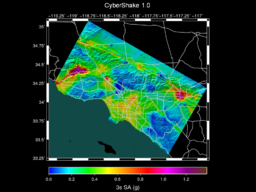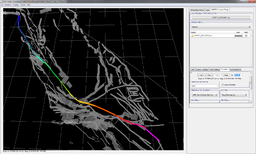Difference between revisions of "CyberShake Meeting - 4 April 2012"
From SCECpedia
Jump to navigationJump to search| Line 26: | Line 26: | ||
'''UCERF3.0 PSHA Calculation Elements''' | '''UCERF3.0 PSHA Calculation Elements''' | ||
| − | *11:15 UCERF3.0 versus UCERF2.0 (N. Field) | + | *11:15 UCERF3.0 versus UCERF2.0 (K. Milner/N. Field) |
*11:30 CyberShake California CVM (P. Chen) | *11:30 CyberShake California CVM (P. Chen) | ||
*11:45 UCERF3.0 Extended ERF (R. Graves) | *11:45 UCERF3.0 Extended ERF (R. Graves) | ||
| Line 44: | Line 44: | ||
'''CyberShake Computational Plans''' | '''CyberShake Computational Plans''' | ||
| − | *15:30 UCERF3.0 time-dependent and on-demand calculations (N. Field) | + | *15:30 UCERF3.0 time-dependent and on-demand calculations (T. Jordan/N. Field) |
*15:45 Phased CyberShake computational approach (T. Jordan) | *15:45 Phased CyberShake computational approach (T. Jordan) | ||
*16:00 Discussion | *16:00 Discussion | ||
Revision as of 17:20, 4 April 2012
- Title: SCEC CyberShake Meeting
- Organizers:Tom Jordan and Phil Maechling
- Date: Tuesday April 4, 2012 (9:30am - 4:30pm)
- Location: SCEC Boardroom, University of Southern California, Los Angeles, CA
- Participants: 25 total
CyberShake Meeting Goals
- Develop scientific and technical basis for integrating SCEC scientific products including UCERF3.0, CVM, and software into a SCEC CyberShake PSHA calculation.
- Develop computational methods and techniques that will enable us to scale-up a CyberShake 1.0Hz PSHA calculation to 5000 sites using UCERF3.0
Agenda & Presentations
Introduction and Meeting Goals
- 09:30 Welcome, Goals, and Objectives (P. Maechling)
- 09:35 CyberShake Overview (T. Jordan)
- 09:45 Recent CyberShake Results (S. Callaghan)
CyberShake Hazard Model Analysis
- 10:00 Analysis of CyberShake Results (F. Wang)
- 10:15 CyberShake Validation using PBR (G. Biasi)
- 10:30 Analysis of Higher Frequency CyberShake Results (K. Olsen)
- 10:45 Northern California CyberShake Calculations (Group)
- 11:00 Break
UCERF3.0 PSHA Calculation Elements
- 11:15 UCERF3.0 versus UCERF2.0 (K. Milner/N. Field)
- 11:30 CyberShake California CVM (P. Chen)
- 11:45 UCERF3.0 Extended ERF (R. Graves)
- 12:00 CyberShake Processing Software (S. Callaghan)
- 12:15 Discussion
- 12:30 Lunch
SCEC HPC Software Developments
- 13:30 AWP-ODC (K. Olsen)
- 13:45 AWP-ODC-GPU (Y. Cui)
- 14:00 Hercules (J. Bielak/R. Taborda)
- 14:15 AWP-Graves (R. Graves)
- 14:30 Workflows on Leadership Class Supercomputers(M. Rynge)
- 14:45 CyberShake data products (P. Maechling)
- 15:00 Blue Waters Status and SCEC Access (J. Alameda)
- 15:15 Discussion
CyberShake Computational Plans
- 15:30 UCERF3.0 time-dependent and on-demand calculations (T. Jordan/N. Field)
- 15:45 Phased CyberShake computational approach (T. Jordan)
- 16:00 Discussion
- 16:15 Next Steps (T. Jordan/P. Maechling)
- 16:30 Adjourn

